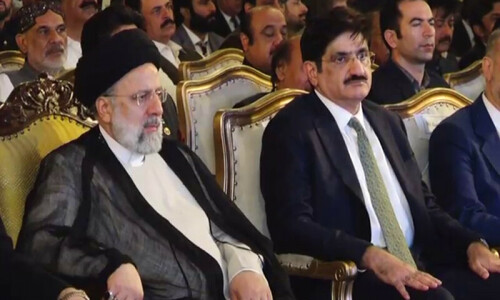ISLAMABAD: Low quality learning outcomes around the world are often blamed on teachers, however, in Pakistan the level of teacher salaries has been identified as the crux of educational problems, according to a report released by the United Nations Educational, Scientific and Cultural Organisation (Unesco).
The Global Education Monitoring Report 2017-18 released by Unesco on Tuesday claimed that Pakistan used test scores as part of teacher evaluations and these should not be used disproportionately in teacher evaluations as they hold teachers accountable for learning — which is influenced by many factors outside of their control such as student skills, behaviour, parental background and support, school resources, culture and curriculum.
The report showed that interventions increased accountability by linking incentives to test scores in Pakistan also altered classroom practices with additional time spent on test preparation -- for instance to improve scores and secure bonuses.
Pakistan only spends 2.65 per cent of its GDP on education which is 4pc below the benchmark. A Unesco situation analysis estimated that attaining the net primary enrolment rate of 100pc by 2015-16 would have required “besides massive improvements in governance and implementation, a fund of Rs1,300 billion”. In the context of literacy, making 36 million people literate in the next five years would require Rs1,788bn.
The report emphasised on government accountability, developing efficient regulations and monitoring mechanisms along with adhering to follow-up sanctions when standards are not met.
“In Pakistan, there are no regulations for public or private schools on health and safety, for instance, or none that can be easily found, and therefore used. One-third of schools in the country have no water or basic sanitation or toilets. Only half of all government schools have usable toilets,” the report pointed out.
“In addition, although 30pc of pupils in Pakistan are in private schools, while there are regulations on the numbers of pupils per teacher in public schools, there are none for private schools. There are therefore 37 pupils per teachers in public schools, but 80 pupils per teacher in private schools,” the report said.
The report highlighted the need for Pakistan to focus on equipping teachers with the skills needed to fulfil their responsibilities. A case study commissioned for the report about Pakistan highlighted a lack of accountability in Pakistan’s teacher requirement, citing political interference, nepotism, ghost teachers and non-transparent practices.
Efforts by many provinces to improve matters were mentioned [in a case study], including a policy in Khyber Pakhtunkhwa (KP) requiring all teachers to undergo a test from the National Testing Services (NTS), increasing the transparency and meritocracy of the teacher hiring process.
Additionally, the KP Independent Monitoring Unit and Punjab Programme Monitoring and Implementing Unit work to ensure that data collection occurs monthly and captures information on teacher and student attendance, retention rates, infrastructure and management.
However, the report claimed that cases still emerged in provinces like Punjab where “despite having qualified on merit, teachers were not considered because of issues like obtaining No Objection Certificates (NOCs) from the highest competent authority and clerical misconducts”, Sindh where involvement of many stakeholders has caused excessive delays in hiring and Balochistan where teachers with fake degrees have managed to enter the system.
The report acknowledged many positive initiatives that the government was taking to improve accountability in education. These include national education monitoring report showing progress and challenges in achieving its education plan and the ‘right to education’ justiciable in national law, which is the case in only 45pc of countries worldwide.
It also praised the use of biometrics to monitor the attendance of over 210,000 education staff in 26,200 schools which has demonstrated positive results. As of February this year, 40,000 absent teachers and 6,000 absconders [employed but long absent] have been disciplined.
The report highlighted the governments’ responsibility to provide universal quality education and stressed that accountability was indispensable in achieving this goal.
It warned that disproportionate blame on any one actor for systemic educational problems could have serious negative side effects, widening inequality and damaging learning.
“Education is a shared responsibility between us all – governments, schools, teachers, parents and private actors,” said Unesco’s Director-General Irina Bokova. “Accountability for these responsibilities defines the way teachers teach, students learn, and governments act. It must be designed with care and with the principles of equity, inclusion and quality in mind,” she added.
Published in Dawn, October 25th, 2017











































